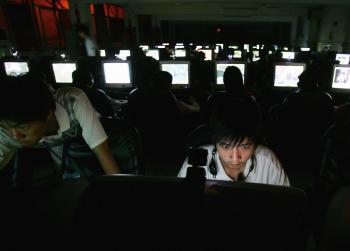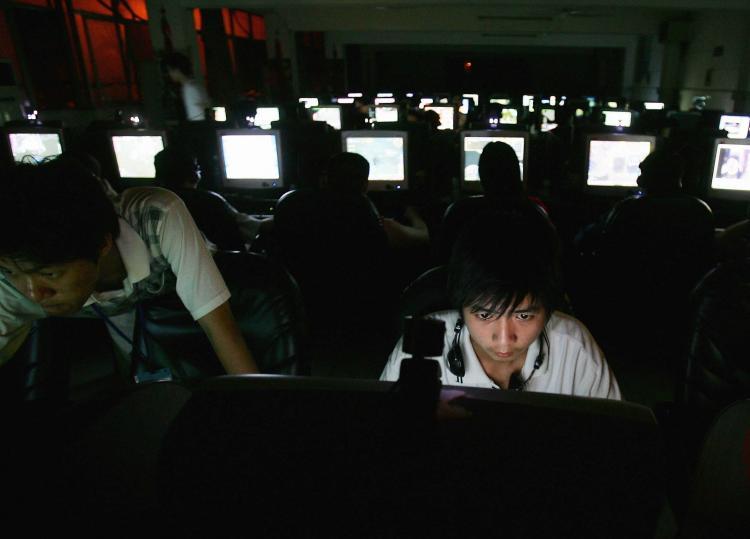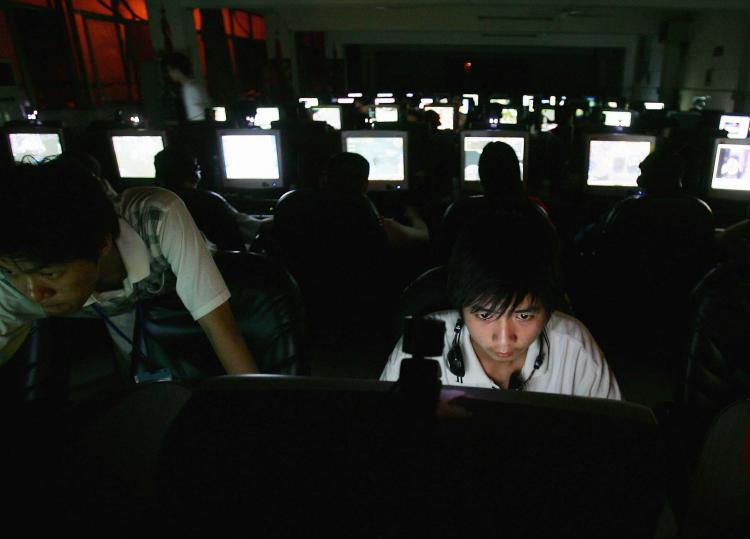Chinese hackers compromised the computer networks of both the Canadian and the Australian governments last February. The attacks are part of a long-term effort by the Chinese regime to dominate other nations through compromising or disrupting their computer networks.
The cyber attacks in Australia were revealed on March 28. The private e-mails of the Australian prime minister are believed to have been hacked, and thousands of e-mails from at least 10 federal ministries were exfiltrated.
In Canada, hackers penetrated computers of the Finance, Defense, and Treasury departments.
The Chinese regime’s use of cyberattacks to gain information from foreign governments is nothing new. Chinese hackers are known to have hit the government network of India in January 2010, campaign e-mails of Obama and McCain in 2008, and the German government’s computers and the computers of the U.S. Defense Department in 2007.
Reports on the cyberattacks have often emphasized the theft of technology, but the taking of e-mails is part of an overall strategy used by the Chinese regime to gain advantage over other countries.
The value of exfiltrated e-mails “would be priceless,” according to Terry Minarcin, retired Air Force cryptographer for the National Security Agency.
“You would not only get personal e-mails, but also the government e-mails,” he said. The information may reveal moral flaws in individuals, and “you could exploit that to your advantage,” Minarcin said.
The Chinese regime’s intelligence agency conducts thorough research on foreign officials in order to coerce or blackmail them. They identify four weak points in human nature: fame, profit, lust, and anger, which they exploit through tailored approaches, a Beijing insider told New Epoch Magazine.
Among the most common forms of blackmail are “honey traps.” Individuals often on invite to China may find a beautiful young girl waiting for them in a hotel room, while cameras record what happens between them.
In China, “Many of the prominent hotels that cater to foreigners are equipped for the technical surveillance of guests and visitors,” states Nicholas Eftimiades in his book “Chinese Intelligence Operations” printed by the Naval Institute Press.
“As simple as this ploy appears Chinese intelligence services have used it to achieve several notable successes,” states Eftimiades.
Having worked in intelligence, intercepting foreign communications, Minarcin notes, however, the value of e-mails goes beyond blackmail. Even without highly classified information, vague bits from numerous e-mails can piece together things of value.
Such an approach was used in China’s “Night Dragon” cyberattacks revealed in February by digital security company McAfee. Since November 2009, Chinese hackers had been stealing information from energy companies.
“This information is highly sensitive and can make or break multibillion dollar deals in this extremely competitive industry,” wrote McAfee Chief Technical Officer George Kurtz on his blog.
Similarly, government e-mail could reveal information on policies or vulnerabilities. “They can see what the policies are going to be,” Minarcin said. “They can know how he’s going to react to certain pressure that you’ve put on him.”
The obscure nature of cyberattacks, which provides deniability to the Chinese regime, has revolutionized traditional forms of espionage. The Chinese regime often vehemently denies any involvement in attacks, although behind-the-scenes investigation often proves guilt.
In the 2007 cyberattack on Pentagon computer networks, an unknown amount of information was unloaded. The Pentagon was forced to shut down part of their computer system—including that serving Defense Secretary Robert Gates. Officials told the Financial Times that the attack was launched by the Chinese military.
The Chinese regime is known to have a large cyber army, although the exact size of this legion of hackers is unknown. Yet, it often puts the blame for cyberattacks onto individual actors. The country is known for its leagues of “patriot hackers”—highly organized groups including the “Honker Union of China” and the “Red Hacker Alliance.”
Read More...Satisfying the Regime’s Requirements
It is suspected the Chinese regime allows the groups to exist so as to draw attention away from its own cyberattacks. But the patriot hackers hardly operate as independent actors. They must satisfy the regime’s requirements.
“If the Chinese hacker alliance did not set very strict internal guidelines or failed to clearly show its support of the government/people, it might quickly find itself censored and broken apart. The political activist nature of the groups making up the alliance has also bolstered their reputation within China and may have perpetuated their nationalistic character,” states Scott J. Henderson in his book “The Dark Visitor, Inside the World of Chinese Hackers.”
The tie between the Chinese regime’s hacker army and patriot hacker groups fell largely to speculation until WikiLeaks released State Department intelligence that discussed the connection.
The State Department asserted that foreign cyberattacks were carried out through a cooperative effort of Chinese “government operatives, private security experts and Internet outlaws recruited by the Chinese government,” states a New York Times report.
The New York Times article says that the hacking of Google e-mails in 2010—an attack dubbed “Operation Aurora”—was part of a larger operation that continued since 2002.
A State Department document originating from the Beijing Embassy in 2010, released by WikiLeaks, states, “A well-placed contact claims that the Chinese government coordinated the recent intrusions of GOOGLE systems. According to our contact, the closely held operations were directed at the Politburo Standing Committee level.”
The scale of Chinese cyberattacks against government networks is massive and can be seen as the opening skirmishes in a new form of warfare. In 2007, a Chinese military white paper described the Chinese regime’s plan to win an “informationized war” by the middle of the century.
“The predominant threat comes from Chinese hackers, who are constantly waging all-out warfare against Defense Department networks,” and “The conflict has reached the level of a campaign-style, force-on-force engagement,” states a 2007 Federal Computer Weekly article, citing a Naval Network Warfare Command official.
It adds that “The motives of Chinese hackers run the gamut, including technology theft, intelligence gathering, exfiltration, research on DOD operations and the creation of dormant presences in DOD networks for future action.”
A blueprint of the Chinese regime’s plan to launch a devastating cyberattack against the United States was also revealed in 2007. The information was contained in a Pentagon report obtained by The Times, a U.K.-based newspaper.
“The blueprint for such an assault, drawn up by two hackers working for the People’s Liberation Army (PLA), is part of an aggressive push by Beijing to achieve ‘electronic dominance’ over each of its global rivals by 2050, particularly the U.S., Britain, Russia and South Korea,” states The Times.
The report outlines the regime’s plan of “crippling an enemy’s financial, military and communications capabilities early in a conflict.”
It adds that the Chinese regime “holds hacking competitions to identify and recruit talented members for its cyber army,” and its 2005 winner, Wicked Rose, went on and “penetrated computers at a defense contractor for U.S. aerospace” in 2005.
The cyber attacks in Australia were revealed on March 28. The private e-mails of the Australian prime minister are believed to have been hacked, and thousands of e-mails from at least 10 federal ministries were exfiltrated.
In Canada, hackers penetrated computers of the Finance, Defense, and Treasury departments.
The Chinese regime’s use of cyberattacks to gain information from foreign governments is nothing new. Chinese hackers are known to have hit the government network of India in January 2010, campaign e-mails of Obama and McCain in 2008, and the German government’s computers and the computers of the U.S. Defense Department in 2007.
Reports on the cyberattacks have often emphasized the theft of technology, but the taking of e-mails is part of an overall strategy used by the Chinese regime to gain advantage over other countries.
The value of exfiltrated e-mails “would be priceless,” according to Terry Minarcin, retired Air Force cryptographer for the National Security Agency.
“You would not only get personal e-mails, but also the government e-mails,” he said. The information may reveal moral flaws in individuals, and “you could exploit that to your advantage,” Minarcin said.
The Chinese regime’s intelligence agency conducts thorough research on foreign officials in order to coerce or blackmail them. They identify four weak points in human nature: fame, profit, lust, and anger, which they exploit through tailored approaches, a Beijing insider told New Epoch Magazine.
Among the most common forms of blackmail are “honey traps.” Individuals often on invite to China may find a beautiful young girl waiting for them in a hotel room, while cameras record what happens between them.
In China, “Many of the prominent hotels that cater to foreigners are equipped for the technical surveillance of guests and visitors,” states Nicholas Eftimiades in his book “Chinese Intelligence Operations” printed by the Naval Institute Press.
“As simple as this ploy appears Chinese intelligence services have used it to achieve several notable successes,” states Eftimiades.
Having worked in intelligence, intercepting foreign communications, Minarcin notes, however, the value of e-mails goes beyond blackmail. Even without highly classified information, vague bits from numerous e-mails can piece together things of value.
Such an approach was used in China’s “Night Dragon” cyberattacks revealed in February by digital security company McAfee. Since November 2009, Chinese hackers had been stealing information from energy companies.
“This information is highly sensitive and can make or break multibillion dollar deals in this extremely competitive industry,” wrote McAfee Chief Technical Officer George Kurtz on his blog.
Similarly, government e-mail could reveal information on policies or vulnerabilities. “They can see what the policies are going to be,” Minarcin said. “They can know how he’s going to react to certain pressure that you’ve put on him.”
Chinese Hackers
The obscure nature of cyberattacks, which provides deniability to the Chinese regime, has revolutionized traditional forms of espionage. The Chinese regime often vehemently denies any involvement in attacks, although behind-the-scenes investigation often proves guilt.
In the 2007 cyberattack on Pentagon computer networks, an unknown amount of information was unloaded. The Pentagon was forced to shut down part of their computer system—including that serving Defense Secretary Robert Gates. Officials told the Financial Times that the attack was launched by the Chinese military.
The Chinese regime is known to have a large cyber army, although the exact size of this legion of hackers is unknown. Yet, it often puts the blame for cyberattacks onto individual actors. The country is known for its leagues of “patriot hackers”—highly organized groups including the “Honker Union of China” and the “Red Hacker Alliance.”
Read More...Satisfying the Regime’s Requirements
It is suspected the Chinese regime allows the groups to exist so as to draw attention away from its own cyberattacks. But the patriot hackers hardly operate as independent actors. They must satisfy the regime’s requirements.
“If the Chinese hacker alliance did not set very strict internal guidelines or failed to clearly show its support of the government/people, it might quickly find itself censored and broken apart. The political activist nature of the groups making up the alliance has also bolstered their reputation within China and may have perpetuated their nationalistic character,” states Scott J. Henderson in his book “The Dark Visitor, Inside the World of Chinese Hackers.”
The tie between the Chinese regime’s hacker army and patriot hacker groups fell largely to speculation until WikiLeaks released State Department intelligence that discussed the connection.
The State Department asserted that foreign cyberattacks were carried out through a cooperative effort of Chinese “government operatives, private security experts and Internet outlaws recruited by the Chinese government,” states a New York Times report.
The New York Times article says that the hacking of Google e-mails in 2010—an attack dubbed “Operation Aurora”—was part of a larger operation that continued since 2002.
A State Department document originating from the Beijing Embassy in 2010, released by WikiLeaks, states, “A well-placed contact claims that the Chinese government coordinated the recent intrusions of GOOGLE systems. According to our contact, the closely held operations were directed at the Politburo Standing Committee level.”
A Cyber Strategy
The scale of Chinese cyberattacks against government networks is massive and can be seen as the opening skirmishes in a new form of warfare. In 2007, a Chinese military white paper described the Chinese regime’s plan to win an “informationized war” by the middle of the century.
“The predominant threat comes from Chinese hackers, who are constantly waging all-out warfare against Defense Department networks,” and “The conflict has reached the level of a campaign-style, force-on-force engagement,” states a 2007 Federal Computer Weekly article, citing a Naval Network Warfare Command official.
It adds that “The motives of Chinese hackers run the gamut, including technology theft, intelligence gathering, exfiltration, research on DOD operations and the creation of dormant presences in DOD networks for future action.”
A blueprint of the Chinese regime’s plan to launch a devastating cyberattack against the United States was also revealed in 2007. The information was contained in a Pentagon report obtained by The Times, a U.K.-based newspaper.
“The blueprint for such an assault, drawn up by two hackers working for the People’s Liberation Army (PLA), is part of an aggressive push by Beijing to achieve ‘electronic dominance’ over each of its global rivals by 2050, particularly the U.S., Britain, Russia and South Korea,” states The Times.
The report outlines the regime’s plan of “crippling an enemy’s financial, military and communications capabilities early in a conflict.”
It adds that the Chinese regime “holds hacking competitions to identify and recruit talented members for its cyber army,” and its 2005 winner, Wicked Rose, went on and “penetrated computers at a defense contractor for U.S. aerospace” in 2005.







